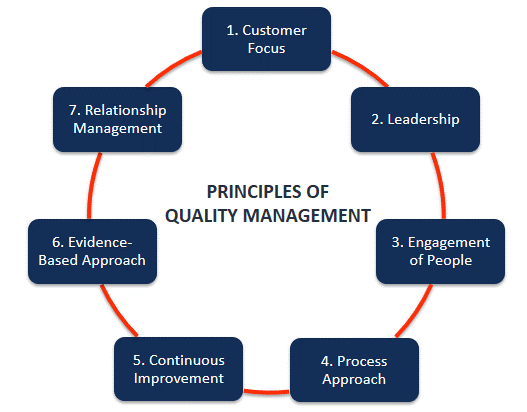Quality Management
Start With Quality, Destination Will Be Excellence

Quality management is a key area of business performance management. The aim of quality management is to ensure that all the organization’s stakeholders work together to improve the organization’s processes, products, services, and culture (people-based improvement) to achieve the long-term success that stems from customer satisfaction.
- It helps an organization achieve greater consistency in tasks and activities that are involved in the production of products and services.
- It increases efficiency in processes, reduces wastage, and improves the use of time and other resources.
- It helps improve customer satisfaction.
- It enables businesses to market their business effectively and exploit new markets.
- It makes it easier for businesses to integrate new employees, and thus helps businesses manage growth more seamlessly.
- It enables a business to continuously improve their products, processes, and systems.
Principles of Quality Management
There are several principles of quality management that are used by top management to guide an organization’s processes towards improved performance. These are depicted in the diagram below:
Quality management consists of four key components, which include the following:
- Quality Planning – The process of identifying the quality standards relevant to the project and deciding how to meet them.
- Quality Improvement – The purposeful change of a process to improve the confidence or reliability of the outcome.
- Quality Control – The continuing effort to uphold a process’s integrity and reliability in achieving an outcome.
- Quality Assurance – The systematic or planned actions necessary to offer sufficient reliability so that a particular service or product will meet the specified requirements.

The process of quality management starts when the organization sets quality targets to be met and which are agreed upon with the customer.
The organization then defines how the targets will be measured. It takes the actions that are required to measure quality. It then identifies any quality issues that arise and initiates improvements.
The final step involves reporting the overall level of the quality achieved.
We support our clients to understand and engage with the principles of quality management.
Our key services include;
- Supporting our clients to understand and engage with the principles of quality management.
- Pre-regulator registration service audit
- Pre-service commissioner contracting due diligence service audit
- Pre-inspection (regulator and service commissioner) service audit
- Independent visitor service quality monitoring
- Regulation 44 monitoring [Ofsted]
- Quality improvement planning
- Quality improvement implementation and implementation progress monitoring.
- Turn-around interim management


